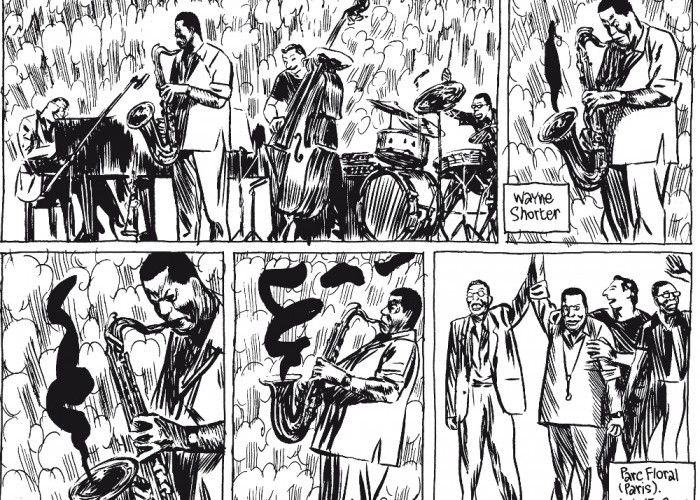Jan 13, 2026 2:09 PM
More Trump-Kennedy Center Cancellations
The fallout from the renaming of the John F. Kennedy Center for the Performing Arts to include President Donald…

A detail from Blutch’s Total Jazz (Fantagraphics Books).
(Photo: Courtesy Fantagraphics Books)There was a time, immediately after the Allies won World War II, when America’s cultural treasures, including jazz, were all the rage around the world, but especially in postwar Europe.
This notion is captured cinematically in the opening act of The Third Man, Carol Reed’s spellbinding 1949 thriller, based on the Graham Greene novel of the same name: On a quest to find his old friend Harry Lime (played by the incomparable Orson Welles), Holly Martins, an American writer of Zane Gray-inspired novels (played by Joseph Cotton), is dumbfounded when, as he explores Vienna, he finds that everyone from the cultural Viennese elite to the occupying British troops know his work.
The bebop explosion that emanated from New York during the 1950s and ’60s always will been a shining musical example of American ingenuity. Its influence still can be felt today.
This ascension is at the heart of Total Jazz, a Fantagraphics book by French cartoonist and graphic novelist Christian Hincker, otherwise known as Blutch, his comics-world pseudonym.
The end pages of Total Jazz frame up blue and violet squares with old-timey spot illustrations of jazz greats from Charlie Parker and Dizzy Gillespie to Ella Fitzgerald and Billie Holiday. This is no surprise: The French always have had a love affair with American jazz. Blutch’s collected works are compiled here from assignments dating to the early aughts, many of which appeared in the now-defunct magazine Jazz Man, published by Alex Dutilh.
The book notably encapsulates the main players on the bandstand and in the recording studio, but also the grumpy festival-goer, the curmudgeonly collector—the ecosystem of jazz-world culture at the height of its popularity, a moment frozen in time, before rock ’n’ roll became the music of young people, and jazz splintered off into the enduring subgenres that persist today.
The majority of Total Jazz starkly is represented in black-and-white comic strips, capturing intimate moments in a blowing session, the allure of the jazz muse, as well as the diary of a jazz consumer and a chart through the decades. Readers also learn about Lee Morgan’s untimely 1972 death, when he was shot by his lover, as well as the secret life of Sun Ra, told only with images and no captions.
The only thing that might throw readers for a loop is the preface, which is a series of line-drawing conversations between two Native Americans, discussing a jazz book of comics. This leads into an Apache operetta called “The Melody Of Words.” The comics style and delivery here is of a different ilk than the rest of Total Jazz, and seems out of place in the collection, almost as if the printer had blown in a signature from another book entirely.
A highlight, however, is the Jazz Detective. “I’m the Jazz Detective, the only one in France,” the first panel reads. “When someone in the city has a jazz problem, there are only a few solutions.” The third panel shows the detective on the phone: “What? What’d you say? July 21, 1967?” And then, as if he’s accessing an encyclopedic history of jazz from inside his mind, the detective says, “Let’s see. July 21, 1967. Bobby Hutcherson is recording Oblique in Englewood Cliffs, NJ with Herbie Hancock, Al Stinson and Joe Chambers. Hancock recorded two days earlier with Miles Davis in NYC (the 19th), which was two days after John Coltrane died (the 17th). That’ll be 300 Euros.”
The comic signs off, like a Philip Marlowe one-liner: “The Jazz Detective always wins.”
Indeed he does. DB

Belá Fleck during an interview with Fredrika Whitfield on CNN.
Jan 13, 2026 2:09 PM
The fallout from the renaming of the John F. Kennedy Center for the Performing Arts to include President Donald…

Peplowski first came to prominence in legacy swing bands, including the final iteration of the Benny Goodman Orchestra, before beginning a solo career in the late 1980s.
Feb 3, 2026 12:10 AM
Ken Peplowski, a clarinetist and tenor saxophonist who straddled the worlds of traditional and modern jazz, died Feb. 2…

The success of Oregon’s first album, 1971’s Music Of Another Present Era, allowed Towner to establish a solo career.
Jan 19, 2026 5:02 PM
Ralph Towner, a guitarist and composer who blended multiple genres, including jazz — and throughout them all remained…

Rico’s Anti-Microbial Instrument Swab
Jan 19, 2026 2:48 PM
With this year’s NAMM Show right around the corner, we can look forward to plenty of new and innovative instruments…

Richie Beirach was particularly renowned for his approach to chromatic harmony, which he used to improvise reharmonizations of originals and standards.
Jan 27, 2026 11:19 AM
Richie Beirach, a pianist and composer who channeled a knowledge of modern classical music into his jazz practice,…